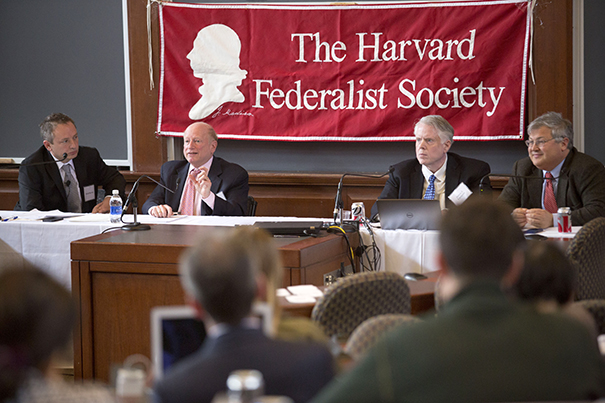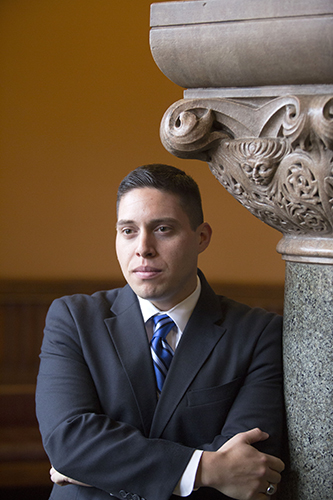
Panelists David Barron, (from left), Mark Tushnet, James Lindgren, and Jack Goldsmith discussed intellectual diversity at law schools in a Harvard Law School talk last week.
Photos by Kris Snibbe/Harvard Staff Photographer
A question of balance
Conflicting views on intellectual diversity in legal education
At Harvard Law School (HLS) on Friday, a panel of four leading legal scholars examined a single question: Is there a lack of intellectual diversity at law schools?
James Lindgren, a law professor at Northwestern University, began with numbers, citing a study in which only 13.2 percent of faculty at the country’s 100 largest law schools reported being “Republican or Republican leaning.” Of law school faculty that have donated more than $200 to a political party, 81 percent have donated to Democrats (91 percent at HLS), according to the study. “My opinion is that there is some discrimination in law school hiring,” Lindgren said.
Moderator David Barron, a Harvard Law professor, then gave the floor to HLS colleague Jack Goldsmith, who served as special counsel to the Department of Defense during the presidency of George W. Bush. Conservatives are sometimes caricatured at Harvard as people “who would turn back the clock in various ways,” Goldsmith said. And conservative views are often scorned, he said, adding, “Most of my colleagues think originalism [and other conservative legal theories] are bunk.”
Goldsmith said that many of his colleagues make questionable intellectual assumptions for their progressive-leaning arguments. “Most conversations here begin from deeply progressive premises, often unreflected” upon, said Goldsmith, who described conservative opinions as having “second-class status” at HLS.
Conservative students at HLS also feel a progressive bias, Goldsmith said. Students have described “open hostility to conservative views in classrooms” and “condescending dismissals of decisions from [Supreme Court Justice Antonin] Scalia” and other conservative justices, he said. “Intellectual intolerance is bad for our community,” Goldsmith told the audience.
Still, the tough intellectual atmosphere has helped him professionally, he said. “I think my scholarship has benefited enormously from having my premises questioned” at HLS, while “my progressive colleagues are harmed by the lack of intellectual diversity.” As for solutions, Goldsmith doesn’t believe a quota system for hiring conservative and libertarian faculty is the answer. The best solution is to find faculty who will teach with a balanced, inclusive approach.
HLS’s Mark Tushnet spoke about the difficulties in hiring conservative faculty from both the supply side and the demand side. On the supply side, he described two problems: First, “evangelicals are underrepresented because they have a general skepticism about law itself,” and second, “conservatives look more favorably upon big firm practice,” he said. On the demand side, continued Tushnet, “law schools are predominantly center-left and do center-left hiring.”
Tushnet contended that law schools in hiring mode “have a greater willingness to look to the far right than the far left,” because those on the far left are sooner viewed as “unsound” compared with those on the far right. Goldsmith pointedly disagreed: “There aren’t any views left of center that are disqualifying,” he said, “but there are views on the right that are.”
Joel Alicea, president of the Harvard Federalist Society, co-sponsor of the event with the Milbank Tweed Student Conference Fund, elaborated on the issues raised, in a conversation with the Gazette.
“What’s lost is the opportunity for students to encounter the best arguments on all sides of a legal issue, articulated in the strongest form by those who actually hold those beliefs,” he said. Without intellectual diversity, “students are not challenged to think deeply about their own views,” so “they will never have had the opportunity to really test their own beliefs. It’s the students who hold the dominant ideology who are hurt most, not conservatives.”






